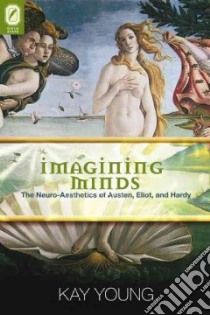Imagining Minds - 9780814251744
Un libro in lingua di Kay Young edito da Ohio State Univ Pr, 2010
- € 28.70
- Il prezzo è variabile in funzione del cambio della valuta d’origine
"Books that manage to bridge two cultures remain a rare commodity, no doubt because authors who can fill the in-between void are hard to find. Imagining Minds is such a book and Kay Young is such an author: I recommend both without reservation. Kay Young is an original scholar, possessed of fresh voice. In equal parts, one hears a committed respect for human weakness, a quiet bemusement at human folly, and a celebration of human intellect. She Certainly has good reason to celebrate her own intellect, which she has cultivated so carefully that she is as much at home in philosophy of mind and neuroscience as she is in literary analysis. When she says `I feel, therefore, I am the mind's story,' she speaks for the writers under her microscope---Austen, Eliot, Hardy---and she knows whereof she speaks."---Antonio Damasio, David Dornsife Professor of Neuroscience, Director, Brain and Creativity Institute, University of Southern California, and author of Descartes' Error, The Feeling of What Happens and Looking for Spinoza
"Kay Young's Imagining Minds is an excellent book: insightful, timely and distinctive, well-informed, and written in a style that is clear, concise, lively, and engaging. It will be a must-read book for narrative theorists, comparable to Lisa Zunshine' Why We Read Fiction and Alan Palmer's Fictional Minds."---Alison A. Case, professor of English, Williams College
"This distinguished book centers on original, learned, and perceptive readings of six classic nineteenth-century British novels, two each by Jane Austen, George Eliot, and Thomas Hardy. These novels are read in the context of the most recent twenty-first-century work in congnitive neuroscience. William James and Antonio Damasio are, however, especially important. Kay Young's theoretical presupposition is that these old novels strikingly foreshadow recent brain science and its discoveries about the interrelations among brains, bodies, consciousnesses, emotions, and the external world, including, especially, other people. Her hypothesis is strikingly confirmed in brilliant detailed readings of the six novels."---J. Hillis Miller, Distinguished Research Professor of Comparative Literature and English, Univesity of California, Irvine
Informazioni bibliografiche
- Titolo del Libro in lingua: Imagining Minds
- Sottotitolo: The Neuro-aesthetics of Austen, Eliot, and Hardy
- Autore: Kay Young
- Editore: Ohio State Univ Pr
- Collana: Ohio State Univ Pr (Paperback)
- Data di Pubblicazione: 28 Ottobre '10
- Genere: LITERARY CRITICISM
- Argomenti : English literature 19th century History and criticism Consciousness in literature Other minds (Theory of knowledge
- ISBN-10: 0814251749
- EAN-13: 9780814251744


